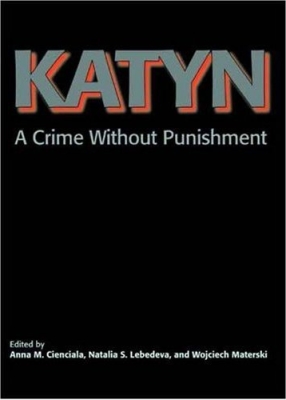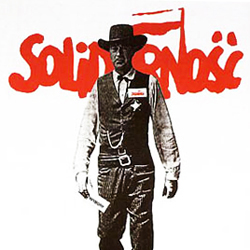 Katyń: A Crime Without Punishment
Katyń: A Crime Without Punishment
Edited by Anna M. Cienciala, Natalia Lebedeva, and Wojciech Materski
Yale University Press, 2007, 561 pages.
Katyń: A Crime Without Punishment is the latest volume in The Annals of Communism series published by Yale University Press. Rightly described as the most important publishing project currently in progress in the United States, it documents the 70-year reign of terror that began with the Communist revolution in Russia and has been largely ignored by western intellectuals – when not actively indulged by them.
One large blind spot in this record is the singular crime known as Katyń – the systematic murder of 22,000 Polish officers, policemen and others held in three special Soviet NKVD prisoner-of-war camps and jails – seemed to be of interest only to Poles and to a small number of western intellectuals who objected to lies as a basis for history, and considered official lies particularly odious.
We owe much then to Yale University Press and to the three historians, leading experts on Katyń from Poland, Russia and the United States, who have given us Katyń, the first English-language publication of documents from archives long closed to historians’ scrutiny.The 122 documents were selected from the multi-volume editions already published in Polish and in Russian, co-edited by Dr. Natalia Lebedeva, the foremost Russian expert on Katyń, author of books and articles on the subject and member of the Institute of General History, Russian Academy of Sciences in Moscow, and Dr. Wojciech Materski, the leading Polish specialist on Polish-Russian Soviet relations, author of 23 books on the subject and Director of The Institute of Political Studies, Polish Academy of Sciences, Warsaw. The American edition was prepared by the distinguished scholar, Dr. Anna Cienciala, a specialist in 20th century Polish diplomatic history and Katyń, professor emerita of history, the University of Kansas, who supervised the translation, added to existing end notes and wrote new introductions to each section that provide an excellent background to the documents.
One of the most heinous crimes committed against the Polish nation during WWII, the Katyń murders were ordered directly from the top, by Stalin and Beria on 5 March 1940, followed by detailed instructions and reports on the delivery of the prisoners to their places of execution. The cover-up of Katyń, as the crime came to be known, was nothing less than the intentional denial of historical fact, specifically the Soviet Union’s role in the war that began with a 22-month long occupation of eastern Poland, 1939-41, following the signing of the Molotov-Ribbentrop Pact by which Germany and the USSR agreed to cooperate in the invasion and partition the country.
The fact that Poland’s World War II allies supported these lies adds to the gravity of the crime and should give historians pause when politics intrudes into their domain. It was no secret that President Roosevelt suppressed the truth about Soviet responsibility for Katyń, nor that Churchill glossed over it, and neither country felt any obligation to acknowledge this deception during the decades-long Cold War. In 1972, a British Foreign Office memorandum blandly stated that, although the Soviet Union was guilty, there was no point in causing trouble: “We see no advantage in breaking the silence that we have preserved for nearly 30 years.”
“There are few subjects more complicated – diplomatically, politically, and militarily – than the destiny of Poland during World War II,” noted the eminent British historian, Simon Sebag Montefiore.
The complication began with the fact that Poland was attacked and occupied in 1939 by two totalitarian regimes, not one, and then is further complicated by the fact that only one of them lost the war while the other, the one more distant from the West, was victorious. It is compounded by political expediency and — perhaps worst of all – by the collusion of far too many historians and other intellectuals who betrayed their calling. Perhaps there should be some equivalent of the Hippocratic oath for historians.
Politicians and historians aside, truth remains alive and gives victims no peace so long as they are forced to live with a lie. The families of the victims never forget; a nation can’t heal until the truth is acknowledged. Nor is the need for truth restricted to those personally affected by a lie; truth has its own intrinsic value.
We must be grateful to all the Poles who refused to forget; to the few historians and writers who kept the subject alive; to the Soviet leaders who did not destroy all of the evidence; to Soviet President Mikhail S. Gorbachev who initiated his policy of glasnost in 1987 – 1988 and admitted Soviet responsibility for the crime in 1990; to Russian President Boris N. Yeltsin who published the decision of March 5 1940 in 1992 and opened the long-sealed archives; and to the Russian historians whose imminent publication of articles about Katyń added pressure for a full, official disclosure.
A very large web of deceit was finally unraveled.In October 1992, Boris Yeltsin delivered copies of the Katyń documents to Polish President Lech Wałęsa in Warsaw. Andrzej Wajda was able to make his film. Cienciala, Lebedeva and Materski, thanks to Yale University Press, have made the documents available in English. * Just in time, it seems. It appears doubtful that Vladimir Putin would permit truth to interfere with his vision of Russia’s past.
CR
* It should be noted that a study of the Katyń crime, based on the Russian documents, appeared four years ago by a British political scientist of Polish descent, see George Sanford, “Katyń and the Soviet Massacre of 1940. Truth, Justice and Memory” (Routledge, Taylor & Francis Group, London and New York, 2005). Unfortunately, it received little attention in professional journals and none in the mainstream press.




Pingback: In Memoriam: Professor Anna Cienciala
Pingback: The Piłsudski Institute Crosses the East River
Thank you for shedding light on the heinous deeds surrounding The Katyn Massacre and the colossal political and diplomatic deceptions that followed.